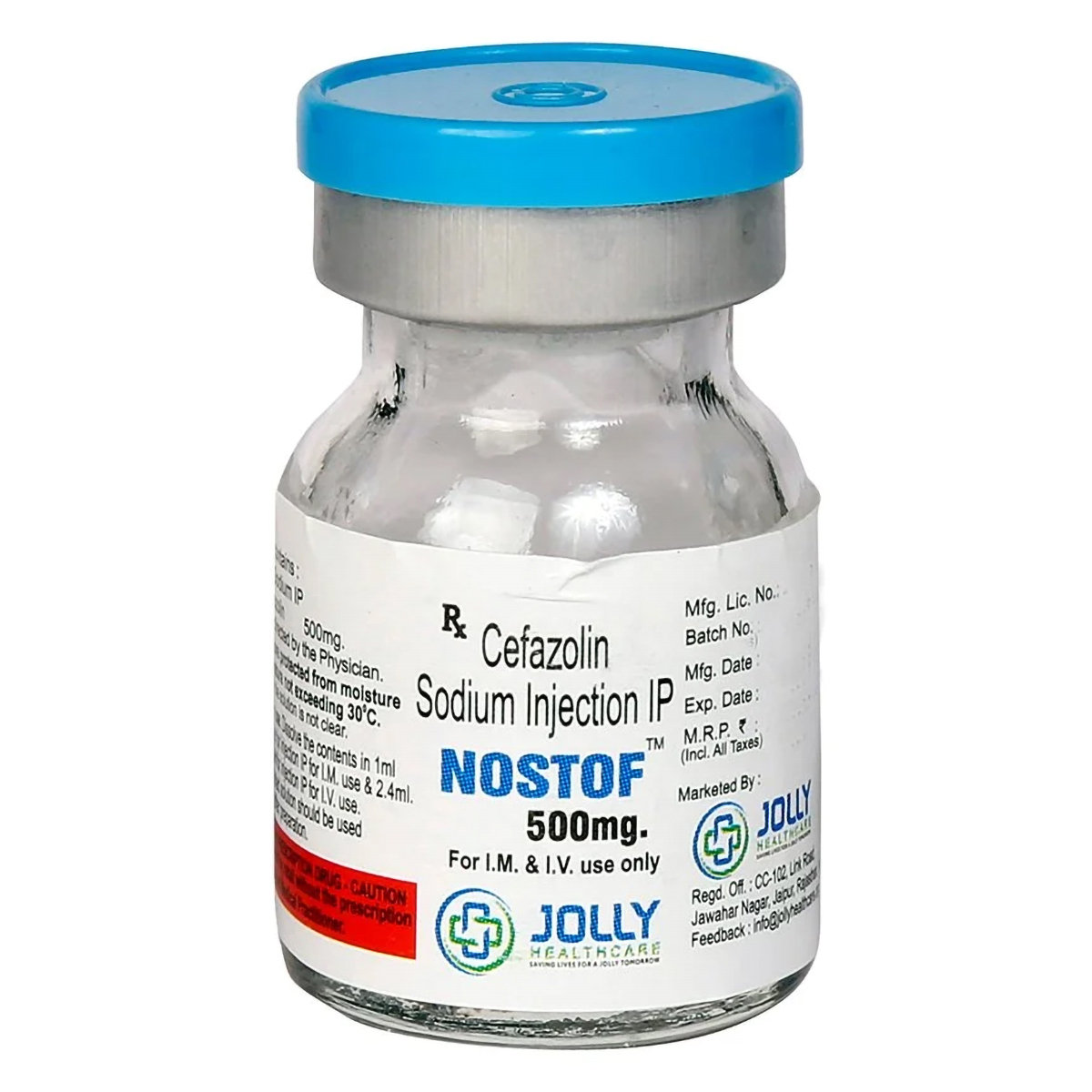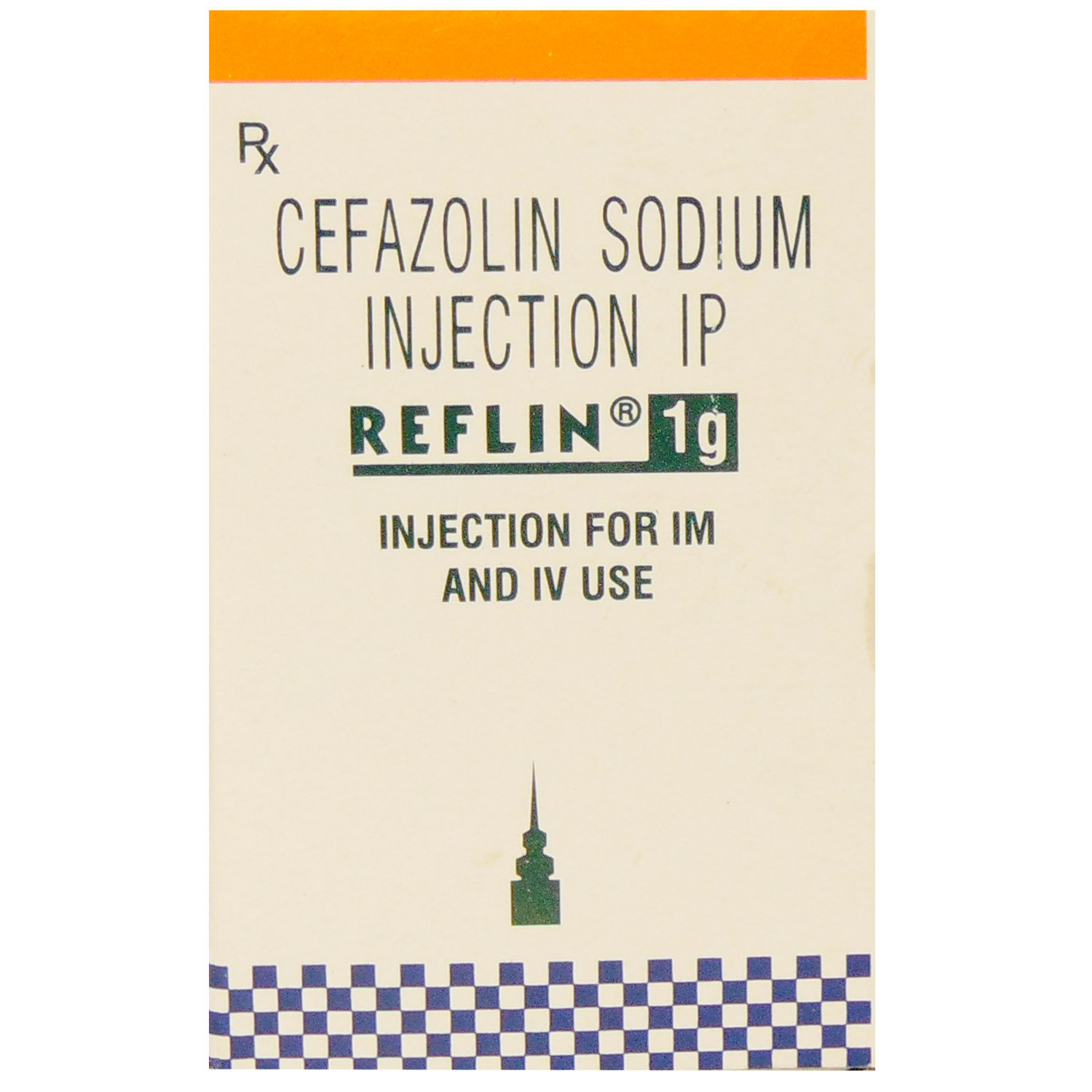Cefazolin
About Cefazolin
Cefazolin belongs to the group of antibiotics called 'cephalosporin' used to treat various bacterial infections of the nose, lungs, ear, bones, joints, skin, urinary tract, prostate gland and reproductive system. Besides this, Cefazolin also used before surgeries to prevent post-surgical bacterial infections. Bacterial infections are caused due to the multiplication of harmful bacteria inside or on the body. Infectious or harmful bacteria can make you sick and reproduce quickly in your body. These harmful bacteria produce chemicals known as toxins, which can damage tissue and make you sick. Cefazolin does not work against infections caused by the virus, including cold and flu.
Cefazolin contains 'Cefazolin' works by interfering with the formation of bacterial cell walls, thereby impairing the bonds that hold the bacterial cell wall together. This allows holes to appear in the bacterial cell walls, which kills the bacteria. Thus, it helps in treating and preventing the spread of infections.
You are advised to take Cefazolin for as long as your doctor has prescribed it for you based on your medical condition. In some cases, you may experience injection site reactions (pain, swelling, redness), vomiting, allergic reaction, nausea, indigestion, diarrhoea, lightheadedness and dizziness. Most of these side effects of Cefazolin do not require medical attention and gradually resolve over time. However, if the side effects persist or worsen, please consult your doctor. Some patients may experience ‘Clostridium difficile associated diarrhoea (CDAD)’ a condition in which healthy bacteria in the colon (intestine) are disrupted.
If you are allergic to Cefazolin, penicillins or any other medicines, please tell your doctor. If you are pregnant or breastfeeding, please inform your doctor before taking Cefazolin. Drive only if you are alert as Cefazolin may cause dizziness. You are recommended to complete the full course of Cefazolin as prescribed by your doctor for effective results. Please do not take Cefazolin on your own as self-medication may lead to antibiotic-resistance in which antibiotics fail to act against specific bacterial infections.
Uses of Cefazolin
Medicinal Benefits
Cefazolin belongs to the group of antibiotic medicines called cephalosporins used to treat various bacterial infections of the brain, lungs, middle ear, abdomen, urinary tract, kidneys, bones, joints, skin, soft tissues, blood, heart, chest, lime disease (caused by tick bites), and gonorrhoea (sexually transmitted disease). It is also used before surgeries to prevent post-surgical bacterial infections. Cefazolin contains Cefazolin is a broad-spectrum antibiotic that is effective against gram-positive and gram-negative bacteria, aerobic and some anaerobic bacteria. Cefazolin works by preventing the formation of bacterial cell covering, which is necessary for their survival. Thereby, kills the bacteria and helps in treating and preventing the spread of infections.
Directions for Use
- Follow your doctor’s instructions on the dosage and timing of this medication.
- Cefazolin will be administered by a nurse or doctor.
- Do not self-administer
Storage
Side Effects of Cefazolin
- Injection site reactions (pain, swelling, redness)
- Nausea
- Vomiting
- Allergic reaction
- Indigestion
- Diarrhoea
- Lightheadedness
- Dizziness
Drug Warnings
If you are allergic to Cefazolin, penicillins or any other medicines, please tell your doctor. If you have kidney or liver problems, diarrhoea, haemolytic anaemia (reduction in red blood cells that may make your skin pale yellow and cause breathlessness or weakness), kidney or gall stones, inflammation of the large intestine, inform your doctor before taking Cefazolin. Do not take Cefazolin on your own as self-medication may lead to antibiotic-resistance in which antibiotics fail to act against specific bacterial infections. Do not take antacids and calcium-containing products along with Cefazolin; maintain a gap of 2-3 hours between both. If you are pregnant or breastfeeding, please inform your doctor before taking Cefazolin. Use Cefazolin with extreme caution in elderly patients above 65 years of age as there is an increased risk of severe adverse effects. You are recommended to complete the full course of Cefazolin as prescribed by your doctor for effective results. Drive only if you are alert as Cefazolin may cause dizziness. Avoid alcohol consumption while taking Cefazolin to prevent unpleasant side-effects. Inform your doctor about all the medicines you are taking and about your health condition to rule out any undesirable side-effects.
Drug Interactions
Drug-Drug Interaction: Cefazolin may interact with a blood thinner (warfarin, heparin), drugs used to lower high uric acid levels (probenecid), water pills or diuretics (furosemide, bumetanide), antibiotics (chloramphenicol, gentamicin, streptomycin, neomycin, tobramycin), vaccine (BCG, cholera, typhoid).
Drug-Food Interaction: Cefazolin may interact with alcohol. Therefore, avoid the consumption of alcohol with Cefazolin as it may increase the risk of adverse effects.
Drug-Disease Interaction: If you have kidney or liver problems, diarrhoea, haemolytic anaemia (reduction in red blood cells that may cause breathlessness or weakness and make your skin pale yellow), kidney or gall stones, inflammation of the large intestine and liver disease, inform your doctor before taking Cefazolin.
Drug-Drug Interactions Checker List:
Safety Advice

Alcohol
unsafeAvoid consuming alcohol while taking Cefazolin to prevent unpleasant side-effects.

Pregnancy
cautionCefazolin is a category B pregnancy drug and is given to pregnant women only if the doctor thinks benefits outweigh risks. Please consult a doctor if you are pregnant or planning for pregnancy.

Breast Feeding
cautionCefazolin may be excreted in human milk in small amounts. Therefore, it is given to breastfeeding mothers only if the doctor thinks benefits are greater than risks. Please consult a doctor if you are breastfeeding.

Driving
cautionCefazolin may cause dizziness in some people. Therefore, avoid driving if you feel dizzy after taking Cefazolin.

Liver
cautionTake Cefazolin with caution, especially if you have a history of Liver diseases/conditions. The dose may be adjusted by your doctor as required.

Kidney
cautionCefazolin should be used in patients with kidney diseases with extreme caution as Cefazolin may cause renal toxicity. Dose adjustments are necessary.

Children
safe if prescribedCefazolin is safe for children if prescribed by a doctor. Do not use Cefazolin in a child without a doctor's advice. Cefazolin should never be used in a premature baby, or in any new-born baby who has jaundice (yellowing of the skin or eyes).
Habit Forming
Diet & Lifestyle Advise
- Take probiotics after completing the full course of Cefazolin to restore some healthy bacteria in the intestines that may have been killed. Taking probiotics after antibiotic treatment can reduce the risk of antibiotic-associated diarrhoea. Certain fermented foods like cheese, yoghurt, kombucha, sauerkraut and kimchi can restore the good bacteria of the intestine.
- Include fibre-rich foods, as they can be easily digested by your gut bacteria, which helps stimulate their growth. Thus, fibre-rich foods may help restore healthy gut bacteria after a course of antibiotics. Whole grains such as whole-grain bread, brown rice should be included in your diet.
- Make sure you drink plenty of water or other fluids every day while you are taking Cefazolin.
- Avoid foods rich in calcium, grapefruit and grapefruit juice as they might hinder the absorption of antibiotics.
- Avoid consumption of alcohol and tobacco to treat your condition effectively.
- To cure your condition effectually complete the full course of Cefazolin even though you find symptomatic relief.
Special Advise
- Cefazolin must not be mixed or administered simultaneously with calcium-containing solutions, including total parenteral nutrition.
- Regular blood tests are recommended if you take Cefazolin for a long time to monitor changes in white blood cells, platelets and liver functioning.
- If you are about to undergo any blood or urine tests, inform your doctor that you are taking Cefazolin as it may interfere with urine test (for sugar) and Coomb’s test results.
Patients Concern
Disease/Condition Glossary
Bacterial infection: A bacterial infection is a condition in which harmful bacteria enter, multiply, and infect our body. Infectious or harmful bacteria can make you sick and reproduce quickly in your body. These harmful bacteria produce chemicals known as toxins, which can damage tissue and make you sick. It can target any body part and multiply very quickly. When you get infected with bacteria, you can experience generalized symptoms like fevers, chills, and fatigue. Bacterial infections vary from minor illnesses like sore throat and ear infections to severe brain infections like meningitis and encephalitis. Few harmful bacteria that cause infections include Streptococcus, Staphylococcus, and E. coli. Anyone can become infected with a bacterial infection. But, people with weak immune systems or taking immunosuppressive medicine are more prone to bacterial infection.
FAQs
Cefazolin is used to treat bacterial infections of the nose, lungs, ear, bones, joints, skin, urinary tract, prostate gland and reproductive system. Besides this, it is also used before surgeries to prevent post-surgical bacterial infections.
Cefazolin contains Cefazolin which works by interfering with the formation of bacterial cell walls, thereby impairing the bonds that hold the bacterial cell wall together. This process ultimately disrupts the formation of bacterial cell wall formation, which kills the bacteria. Thus, it helps in treating and preventing the spread of infections.
Diarrhoea might be a side-effect of Cefazolin. Drink lots of fluids and eat food rich in fibre if you experience diarrhoea. If you find blood in stools (tarry stools) or if you experience excess diarrhoea, consult your doctor. Do not take anti-diarrheal medicine on your own.
It is recommended to complete the course of Cefazolin even if you feel better as it is an antibiotic, and leaving it in between may lead to even severe infection that will, in fact, stop responding to the antibiotic as well (antibiotic resistance).
Cefazolin may interfere with urine test (for sugar) and Coomb’s test (blood test) giving false-positive results. Therefore, if you are about to undergo any laboratory tests, inform your doctor or lab technician that you are taking Cefazolin.
Cefazolin should be used with caution in patients with kidney problems as it may increase the risk of adverse effects. Therefore, inform your doctor if you have any kidney problems before taking Cefazolin so that the dose may be adjusted accordingly.
Consult the doctor if you think Cefazolin isn’t working for you. Your doctor may increase the dose or prescribe alternate medication based on your condition.
Consult the doctor if your condition does not get better even after completing the duration of treatment or if your condition worsens during treatment with Cefazolin.
In some cases, Cefazolin may cause side effects like injection site reactions (pain, swelling, redness), vomiting, allergic reaction, nausea, indigestion, diarrhoea, lightheadedness and dizziness. Most of these side effects of Cefazolin do not require medical attention and gradually resolve over time. However, if the side effects persist or worsen, please consult your doctor.




